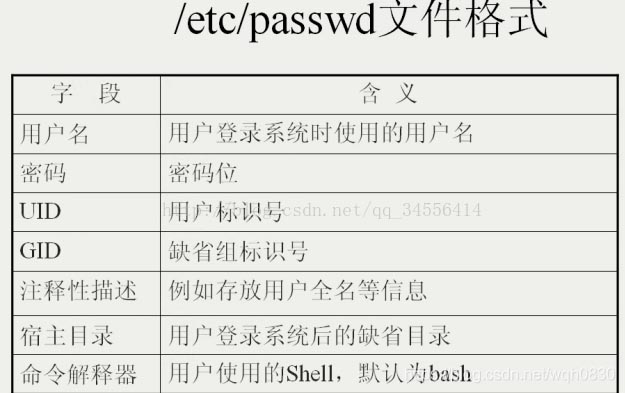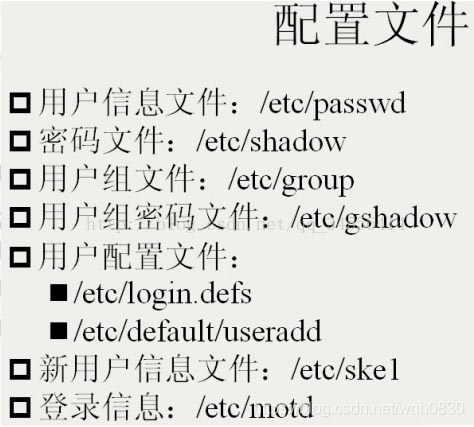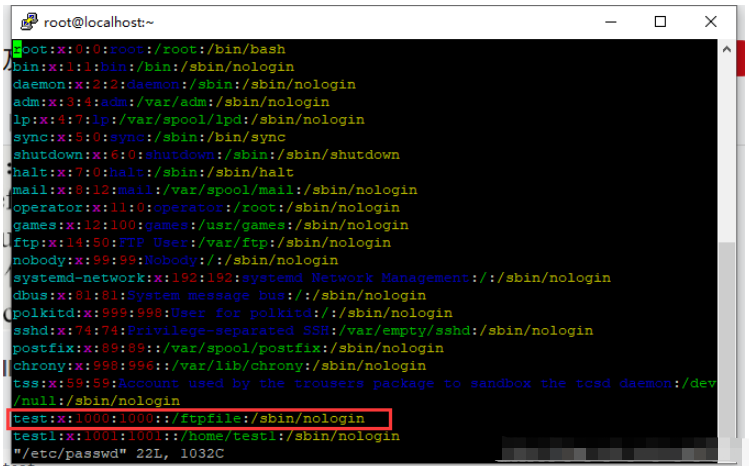 Operation and Maintenance
Operation and Maintenance
 Linux Operation and Maintenance
Linux Operation and Maintenance
 How to create users, add and modify shells in Linux
How to create users, add and modify shells in Linux
How to create users, add and modify shells in Linux
1. Create user
useradd -d /test -s /bin/bash -m test
-d: Specify the user’s home directory-s: User’s login shell-m: Create user home directory
Create password:
passwd test然后输入两遍新密码
2. View the created users
vim /etc/passwd
This file records the information of all users, with 7 pieces of information separated by 6 colons: For example: root:x:0:0:root: /root:/bin/bash


3. Modify the user’s login shell
1) Command modification:
usermod -s /sbin/nologin test usermod -s /bin/false test ...
2) Directly modify the /etc/passwd file:
vim /etc/passwd

4. The user’s login shell
shell is where the user communicates with the computer As a medium, the login shell ensures communication between the user and the computer, while the non-login shell cannot allow the computer to communicate with the user. Information recording the user's default login shell is stored in the /etc/passwd file.
Login shell can be used by users to log in, such as /bin/bash,/bin/sh,/bin/csh...General Linux The default user shell is bash, which means you can log in and write commands.
Non-login shell: The classic /bin/nologin is a non-login shell, that is to say, if a user defaults to it, even if the user logs in Linux cannot use linux either.
Non-login shell has its own specific use. For example, if you build an ftp server using Linux and create multiple users, you can change the default shell of these users to nologin, so First, although these users are users on Linux, they cannot log in to the Linux host and can only enter the ftp server, which also ensures security!
For example:
//登录shell /bin/sh /bin/bash /usr/bin/sh /usr/bin/bash //非登录shell /sbin/nologin /bin/false ...
##/bin/false
: Do nothing but return an error status, then immediately quit. If the user's shell is set to /bin/false, the user will be unable to log in and there will be no prompt./sbin/nologin
: Will politely display a message to the user and refuse the user to log in: This account is currently not available. There are some software, such as some FTP server software, for local non-virtual accounts, only users with a valid shell can use the FTP service. At this time, you can use nologin to prevent users from logging in to the system and still using some system services, such as ftp services. /bin/false does not work, this is one of the important differences between the two./etc/nologin
: If the /etc/nologin file exists, the system only allows the root user to log in, and all other users are denied login, and a message is displayed to them The contents of the /etc/nologin file.
The above is the detailed content of How to create users, add and modify shells in Linux. For more information, please follow other related articles on the PHP Chinese website!

Hot AI Tools

Undresser.AI Undress
AI-powered app for creating realistic nude photos

AI Clothes Remover
Online AI tool for removing clothes from photos.

Undress AI Tool
Undress images for free

Clothoff.io
AI clothes remover

Video Face Swap
Swap faces in any video effortlessly with our completely free AI face swap tool!

Hot Article

Hot Tools

Notepad++7.3.1
Easy-to-use and free code editor

SublimeText3 Chinese version
Chinese version, very easy to use

Zend Studio 13.0.1
Powerful PHP integrated development environment

Dreamweaver CS6
Visual web development tools

SublimeText3 Mac version
God-level code editing software (SublimeText3)

Hot Topics
 What computer configuration is required for vscode
Apr 15, 2025 pm 09:48 PM
What computer configuration is required for vscode
Apr 15, 2025 pm 09:48 PM
VS Code system requirements: Operating system: Windows 10 and above, macOS 10.12 and above, Linux distribution processor: minimum 1.6 GHz, recommended 2.0 GHz and above memory: minimum 512 MB, recommended 4 GB and above storage space: minimum 250 MB, recommended 1 GB and above other requirements: stable network connection, Xorg/Wayland (Linux)
 Linux Architecture: Unveiling the 5 Basic Components
Apr 20, 2025 am 12:04 AM
Linux Architecture: Unveiling the 5 Basic Components
Apr 20, 2025 am 12:04 AM
The five basic components of the Linux system are: 1. Kernel, 2. System library, 3. System utilities, 4. Graphical user interface, 5. Applications. The kernel manages hardware resources, the system library provides precompiled functions, system utilities are used for system management, the GUI provides visual interaction, and applications use these components to implement functions.
 How to run java code in notepad
Apr 16, 2025 pm 07:39 PM
How to run java code in notepad
Apr 16, 2025 pm 07:39 PM
Although Notepad cannot run Java code directly, it can be achieved by using other tools: using the command line compiler (javac) to generate a bytecode file (filename.class). Use the Java interpreter (java) to interpret bytecode, execute the code, and output the result.
 vscode cannot install extension
Apr 15, 2025 pm 07:18 PM
vscode cannot install extension
Apr 15, 2025 pm 07:18 PM
The reasons for the installation of VS Code extensions may be: network instability, insufficient permissions, system compatibility issues, VS Code version is too old, antivirus software or firewall interference. By checking network connections, permissions, log files, updating VS Code, disabling security software, and restarting VS Code or computers, you can gradually troubleshoot and resolve issues.
 How to check the warehouse address of git
Apr 17, 2025 pm 01:54 PM
How to check the warehouse address of git
Apr 17, 2025 pm 01:54 PM
To view the Git repository address, perform the following steps: 1. Open the command line and navigate to the repository directory; 2. Run the "git remote -v" command; 3. View the repository name in the output and its corresponding address.
 Can vscode be used for mac
Apr 15, 2025 pm 07:36 PM
Can vscode be used for mac
Apr 15, 2025 pm 07:36 PM
VS Code is available on Mac. It has powerful extensions, Git integration, terminal and debugger, and also offers a wealth of setup options. However, for particularly large projects or highly professional development, VS Code may have performance or functional limitations.
 How to use VSCode
Apr 15, 2025 pm 11:21 PM
How to use VSCode
Apr 15, 2025 pm 11:21 PM
Visual Studio Code (VSCode) is a cross-platform, open source and free code editor developed by Microsoft. It is known for its lightweight, scalability and support for a wide range of programming languages. To install VSCode, please visit the official website to download and run the installer. When using VSCode, you can create new projects, edit code, debug code, navigate projects, expand VSCode, and manage settings. VSCode is available for Windows, macOS, and Linux, supports multiple programming languages and provides various extensions through Marketplace. Its advantages include lightweight, scalability, extensive language support, rich features and version
 Where to write code in vscode
Apr 15, 2025 pm 09:54 PM
Where to write code in vscode
Apr 15, 2025 pm 09:54 PM
Writing code in Visual Studio Code (VSCode) is simple and easy to use. Just install VSCode, create a project, select a language, create a file, write code, save and run it. The advantages of VSCode include cross-platform, free and open source, powerful features, rich extensions, and lightweight and fast.





